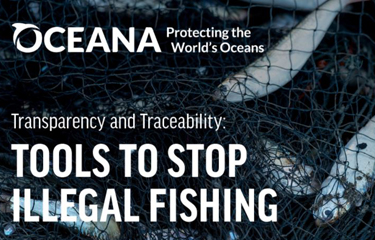Oceana, NRDC call for expansion of Seafood Import Monitoring Program

Marine sustainability non-governmental organization Oceana is calling for the expansion of the U.S. Seafood Import Monitoring Program (SIMP) and for mandatory full-chain traceability requirements for all seafood sold in the United States.
A 3 March Oceana report, “Transparency and Traceability: Tools to Stop Illegal Fishing,” criticizes the current limitations of SIMP, in that the law currently applies to just 13 types of imported seafood and traces them to the U.S. border, not beyond. Extending SIMP to cover all seafood species sold in the United States, and requiring that all be covered by full-chain traceability from boat to plate, would reduce species mislabeling and help in the fight against illegal, unreported, and unregulated (IUU) fishing, Oceana said.
“Americans have a right to know more about the seafood they eat and should have confidence that their dollars are not supporting the pillaging of the oceans or human rights abuses at sea,” Beth Lowell, Oceana’s deputy vice president for U.S. campaigns, said in a press release. “All seafood sold in the U.S. should be safe, legally caught, responsibly sourced, and honestly labeled. Until then, honest fishermen, seafood businesses, consumers and the oceans will pay the price.”
Oceana estimated up to 32 percent of wild-caught seafood imports into the United States are products of illegal or unreported fishing. Due to a lack of rules and enforcement, IUU fishing “is a low-risk, high-reward activity,” it said.
“Before demanding transparency elsewhere, the U.S. must embrace transparency at home,” it said.
The U.S. can improve its sustainability performance by mandating that automatic identification systems (AIS) are required on all fishing vessels longer than 48 feet, according to Oceana Illegal Fishing and Transparency Analyst Marla Valentine.
“To effectively fight IUU fishing on a global scale, there must be expanded transparency of the commercial fishing industry,” Valentine said. “U.S. requirements to carry automatic identification system devices, which bolster transparency at sea, currently fall short.”
Oceana praised a move by the U.S. Food and Drug Administration to consider a proposed rule under the Food Safety Modernization Act (FSMA) that would establish additional traceability recordkeeping requirements for seafood companies.
“The Biden-Harris administration has an opportunity to lead in the fight against illegal fishing and seafood fraud, leveling the playing field for American fishermen and seafood businesses, while protecting consumers and the oceans,” Lowell said. “The United States must take decisive action to combat IUU fishing and close the U.S. market to all illegally sourced products, including seafood caught using forced labor or other human rights abuses. The United States can be a leader in traceability of seafood and transparency at sea.”
Several of the report’s recommendations were echoed by a separate National Resources Defense Council report, “On the Hook: How the United States Enables Illegal, Unreported, and Unregulated Fishing,” published 2 March.
The report claims that 1) The electronic import control system the United States uses to analyze seafood imports is too reliant on human analysis to quickly identify most high-risk seafood shipments; 2) The U.S. investigatory and enforcement capacity is grossly inadequate; 3) U.S. federal interagency partnerships and federal and state partnerships are not being leveraged fully; and 4) The Seafood Import Monitoring Program has not been implemented robustly enough to realize its potential.
Photo courtesy of Oceana






Share